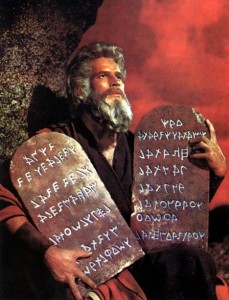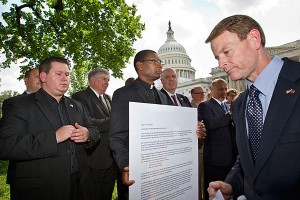Tomorrow evening the Jewish community begins the holiday of Passover. We tell the story of the journey from slavery in Egypt to freedom in the Promised Land. The hero of that journey is Moses.
In Jewish tradition Moses is the greatest prophet the Jewish people ever had. He is the law-giver, teacher and scribe of God. He challenges Pharaoh, leads the people through the desert, and guides them to the edge of the Promised Land.
His life ends on a poignant note, as God permits him to see the promised land from afar, but does not permit him to enter it. Moses’ final resting place is unknown because, according to the Jewish sages, God did not want the people to turn Moses into a divine figure. He was simply the Jewish people’s greatest prophet.
How Moses’ Life Begins
Moses’s birth seems to suggest he was destined for great things. Unlike the other Israelites, he never experiences slavery. He is placed on a basket immediately after birth and sent floating down the Nile River. His sister Miriam watches his basket from reeds beside the river, and sees the daughter of Pharaoh take the basket and find the Hebrew child.
In the Bible, Pharaoh’s daughter has no name, but later Jewish commentators call her Batya, which means “daughter of God.” Her compassion and humanity lead her to adopt Moses as her own son. He is raised in Pharaoh’s palace, a “Prince of Egypt,” presumably afforded all the luxuries and opportunities of Egyptian royalty.
Leaving Royalty
Everything changes the day he first leaves the royal palace. His age at the time is unknown, but later interpreters suggest he was 15. He sees Egyptian task-masters whipping Israelite slaves.
Although the text does not tell us how and when he learned he was an Israelite, Moses knows the slaves are his people, and he acts to defend them. He kills one of the Egyptian taskmasters.
The next thing he does is stop a fight between two of the Israelite slaves. After he does so, one of them taunts him and says, “Are you going to kill me in the same way you killed the Egyptian?”
Moses realizes that word of his crime will spread, and he will be wanted man in Egypt. He flees for Midian, which is a desert land of shepherds and nomads.
His first stop in Midian is at a well. He encounters a group of hostile shepherds attacking a group of seven sisters. Moses defends them and drives the shepherds away. He returns with the daughters to their home and meets their father Jethro, a local priest. Moses soon marries one of the sisters he saved named Zipporah.
A Passion for Justice
What unites Moses’ first three actions is his passion for justice.
- He could not bear seeing a helpless slave beaten by an Egyptian task-master.
- He could not stay silent as two Israelites fought one another.
- And he could not stand by as Midianite shepherds attacked a group of defenseless sisters.
Moses does not stand idly by as others suffer and bleed. That quality made him the Jewish people’s greatest leader.
To get a free book and receive Rabbi Moffic’s weekly digest of Jewish wisdom, click here.


